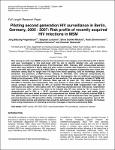Piloting second generation HIV surveillance in Berlin, Germany, 2005 - 2007
Risk profile of recently acquired HIV infections in MSM
Bätzing-Feigenbaum, Jörg
Loschen, Stephan
Gohlke-Micknis, Silvia
Zimmermann, Ruth
Kücherer, Claudia
Hamouda, Osamah
Men having sex with men (MSM) are by far the transmission-risk-category most affected by HIV in Berlin and were investigated in this pilot-study with the aim to identify detailed risk- and prevention-behaviours in recently infected persons. From November, 2005 - February, 2007, venous blood samples were taken from patients in Berlin aged ≥18 years within 3 months after diagnosis of HIV-infection and tested with BED IgG-capture-ELISA (BED-CEIA) to differentiate between longstanding and recent HIV-infections dating back no longer than 140 days from blood sampling. Data on knowledge, attitudes, behaviour and practices (“KABP-survey”) relating to HIV/AIDS, were collected anonymously by structured patients’ questionnaires, accomplished by demographic data via additional questionnaires filled by the physicians. SPSS 15.0 was used for data analysis. This sub-analysis includes 37 MSM with confirmed recently acquired HIV infection. Mean age was 34 years (20 - 53). Good knowledge on HIV/AIDS in Germany and transmission risks was present in most cases; nevertheless unprotected sexual contacts were indicated by 90% of recently HIV-infected MSM (independent from type of intercourse and partners’ sero-status) with 64% reporting unprotected anal intercourse. Unprotected anal intercourse with a person they knew to be infected with HIV was stated by 19% of cases. In 5% drugs/alcohol and in 48% (n = 18/37) uncertain HIV-related knowledge, hope and beliefs about transmission risks were stated as reasons for unprotected sex. Almost half of recently infected MSM in this pilot-study were infected because hope and beliefs on HIV-transmission-risks had guided their personal decisions on HIV-prevention efforts. Limitations due to a small study population, lack of HIV-negative-tested controls and selection bias should be optimised in future studies; however, the findings have strong implications for amending prevention messages in Germany addressing MSM.
No license information

